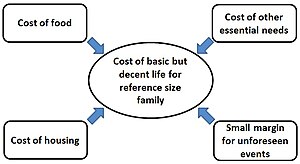
Back أجر المعيشة Arabic Yaşayış minimumu Azerbaijani Пражытковы мінімум BE-X-OLD Životní minimum Czech Eksistensminimum Danish Existenzminimum German Dumviva salajro Esperanto Salario decente Spanish دستمزد کافی برای امرار معاش Persian Minimum vital French

A living wage is defined as the minimum income necessary for a worker to meet their basic needs.[3] This is not the same as a subsistence wage, which refers to a biological minimum, or a solidarity wage, which refers to a minimum wage tracking labor productivity. Needs are defined to include food, housing, and other essential needs such as clothing. The goal of a living wage is to allow a worker to afford a basic but decent standard of living through employment without government subsidies.[4] Due to the flexible nature of the term "needs", there is not one universally accepted measure of what a living wage is and as such it varies by location and household type.[5] A related concept is that of a family wage – one sufficient to not only support oneself, but also to raise a family.
The living wage differs from the minimum wage in that the latter can fail to meet the requirements for a basic quality of life, which leaves the worker to rely on government programs for additional income.[6] Living wages have typically only been adopted in municipalities. In economic terms, a minimum wage is a price floor for labor created by a legal threshold, rather than a reservation wage created by price discovery. The living wage is one possible guideline for determining a target price floor, while a minimum wage is a policy to enforce a chosen price floor.

In the United Kingdom and New Zealand, advocates define a living wage to mean that a person working 40 hours a week, with no additional income, should be able to afford the basics for a modest but decent life, such as, food, shelter, utilities, transport, health care, and child care.[7][8] Living wage advocates have further defined a living wage as the wage equivalent to the poverty line for a family of four. The income would have to allow the family to "secure food, shelter, clothing, health care, transportation and other necessities of living in modern society".[9] The definition of a living wage used by the Greater London Authority (GLA) is the threshold wage, calculated as an income of 60% of the median, and an additional 15% to allow for unforeseen events.[5]
Living wage campaigns came about partially as a response to Reaganomics and Thatcherism in the US and UK, respectively, which shifted macroeconomic policy towards neoliberalism.[10] A living wage, by increasing the purchasing power of low income workers, is supported by Keynesian and post-Keynesian economics, which focuses on stimulating demand in order to improve the state of the economy.[10]
- ^ a b Anker, Richard; Anker, Martha (27 January 2017). Living Wages Around the World: Manual for Measurement. Edward Elgar Publishing. p. 19. ISBN 9781786431462.
- ^ a b Glasmeier, Amy (2016). "Living Wage Calculator, User's Guide / Technical Notes" (PDF). Archived from the original (PDF) on 18 February 2018.
- ^ "LIVING WAGE | definition in the Cambridge English Dictionary". dictionary.cambridge.org. Retrieved 26 January 2020.
- ^ Richard, Anker (27 January 2017). Living wages around the world : manual for measurement. Cheltenham. p. 8. ISBN 9781786431462. OCLC 970036008.
{{cite book}}: CS1 maint: location missing publisher (link) - ^ a b "How a living wage is calculated". The Economist. 20 May 2015. Retrieved 27 April 2017.
- ^ Alderman, Liz; Greenhouse, Steven (27 October 2014). "Fast Food in Denmark Serves Something Atypical: Living Wages". New York Times. Retrieved 27 October 2014.
- ^ Conor D’Arcy, David Finch (November 2017). "Calculating a Living Wage for London and the rest of the UK" (PDF). Living Wage Foundation.
- ^ "What is the Living Wage?". Living Wage Movement Aotearoa NZ. Retrieved 15 December 2017.
- ^ Clary, Betsy Jane (1 November 2009). "Smith and Living Wages: Arguments in Support of a Mandated Living Wage". American Journal of Economics and Sociology. 68 (5): 1063–1084. doi:10.1111/j.1536-7150.2009.00653.x. ISSN 1536-7150.
- ^ a b Werner, Andrea; Lim, Ming (1 September 2016). "The Ethics of the Living Wage: A Review and Research Agenda". Journal of Business Ethics. 137 (3): 433–447. doi:10.1007/s10551-015-2562-z. hdl:2381/42274. ISSN 0167-4544.